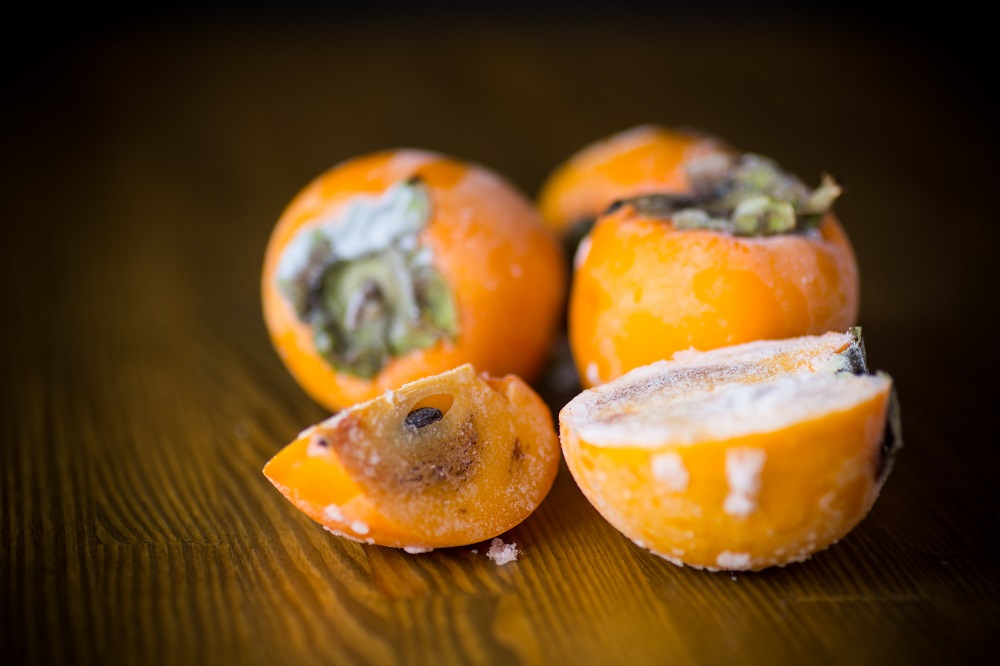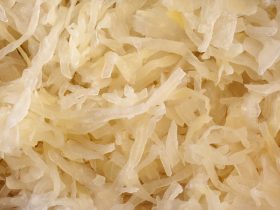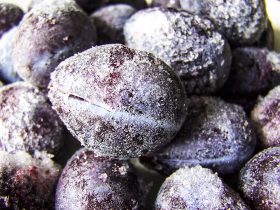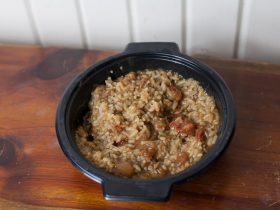The persimmon is an orange fruit with a uniquely soft flesh and a tomato-like appearance. Originating primarily from the country of China and subsequently farmed in mass numbers there, the persimmon has propagated throughout much of the world owing to its sweet and mild flavor.
However, just like tomatoes, the persimmon is in large part primarily made of water and as such is highly susceptible to colonization by bacterial and fungal life forms, causing its eventual spoilage if left unpreserved for any significant length of time.
This may be prevented by taking the correct steps, as is outlined in this article.
Persimmon can be frozen in the event that you desire to preserve it in that particular fashion. However, it is not advisable in every given situation because of the fact that persimmons will experience detrimental effects from the expansion of water both intracellularly and at a macro level, affecting its texture and visual appearance.
Do Persimmons Freeze Well?
While it is entirely possible to freeze a persimmon in order to extend its shelf-life to a longer period than would normally be seen if left unpreserved, the process of freezing the persimmons is not without its own drawbacks and as such must be weighed against the relatively long extension of the fruit’s shelf-life.

Persimmons, when treated for freezing and insulated in several ways, will only experience a moderate loss of textural cohesion and physical integrity once removed from the freezer. This may be mitigated by incorporating the previously frozen persimmons into a dish that does not require them to retain their firmness or appearance.
As such, it is best to only freeze persimmons once they have fully ripened and you do not intend to use them in their sliced form or other utilizations that do not involve mashing or blending the fruit.
Can You Freeze Unripe Persimmons?
Fruit undergoes the process of ripening through a host of enzymes produced by their own internal plant cells, of which will initiate the degradation of the fruit so as to allow it to fulfill its primary purpose; that of a reproductive vessel for the plant itself.
However, much like other chemical reactions, the exact intermolecular action taking place is either slowed or stopped entirely when placed in an environment with sufficiently low enough temperatures, which will slow down the movement of atoms and their subsequent effects therein.
This slowing of the chemical ripening effect is sufficient enough to essentially stop the fruit in its current state, leaving it unripe until removed from the freezer.
The particular drawback to this method, however, is that not only will the fruit experience a significant reduction in textural quality but also may not even begin ripening again after being thawed.
As such, we do not recommend freezing persimmons until they have reached their ideal ripeness or close to it.
How Long Do Ripe Persimmons Take to Go Bad?
The particular length at which persimmons last on the countertop or within the pantry once they have fully ripened may depend on a variety of factors, however is primarily found to be approximately two days if left unattended.
The factors that may shorten or lengthen this relatively miniscule length of time are that of humidity, temperature, direct sunlight and the presence of certain other fruits stored within the same air space as the persimmons.
Using this information, if choosing to store persimmons outside of a cold environment with an internal control of its own relative humidity, it is best to keep persimmons in a non-air-tight container made of an odor free material and stored in a dark and dry corner.
Can Persimmons be Refrigerated?
Persimmons may be refrigerated and doing so is considered one of the more appropriate methods to extend their shelf-life within a home or otherwise non-warehouse storage environment.
This is due to the fact that commercially available refrigerators offer both internal temperature and humidity control, allowing the user to keep fruits and vegetables with differing storage environment needs together without compromising their shelf-stability.
If choosing to store persimmons in the refrigerator, it is important to first allow them to ripen, as even the relatively mild cold of the fridge may act as an inhibitor for the enzymes utilized in the fruit’s own internal ripening process.
To begin, poke holes within a resealable plastic so as to allow the fruit to “breathe”, giving it a small amount of air-flow that will prevent the ethylene ripening compound from remaining in the same air space as the fruit, causing it to spoil more quickly.
Place the fruit within the resealable plastic bag and only partially close it, leaving some space at the opening to further facilitate air flow. Keep the bag of persimmons near the crisper drawer of your refrigerator but not inside it for up to a length of five days.
How to Freeze Persimmon
In order to begin freezing persimmon, all you will need is a baking tray with or without lining, plastic cling wrap, aluminum foil, and a freezer capable of reaching temperatures at or below 32°F.
First, wash the persimmons beneath a cold tap, lightly brushing the surface with your fingertips so as to dislodge any dirt or insects that may still be clinging to it. Once washed, dry the fruit thoroughly with a cloth towel.
Place the now clean persimmons at an even distance from one another on the baking tray, ensuring that they are not touching each other so as to prevent the individual fruits from freezing into a single shape. Move the baking tray to the freezer, uncovered, for approximately two hours or until the persimmons have frozen firm.
After this period of time has elapsed, remove the tray from the freezer and wrap each individual persimmon in plastic cling film, alternating the directions at which you wrap so as to produce an air-tight insulating layer, preventing freezer burn if the fruit’s flesh comes into contact with the freezer air.
Double this insulation against the freezing environment by then wrapping the persimmon once more, this time in aluminum foil. Just like before, ensure that no open spaces are left on the surface of the fruit that may come into contact with the freezer air.
Place the twice insulated persimmons in the deepest part of your freezer for up to an approximate three months.
How to Thaw Persimmon
Thawing persimmons must be done gradually so as to reduce the total damage done to their physical integrity and texture as ice crystals within the fruit begin to shrink, deflating the persimmon at a cellular level.
To do so, remove your desired volume of persimmon from the freezer and place them in the refrigerator overnight with the first layer of insulating aluminum foil removed so as to prevent a majority of water condensation.
If so desired, you may instead place the persimmon at room temperature for approximately one hour to speed up the thawing process, though it is likely that this method will cause a larger loss in physical cohesion and as such should only be done if absolutely necessary.
References
1. Morton JF (1987). “Japanese persimmon”. NewCROP, New Crops Resource Online Program, Purdue University Center for New Crops and Plant Products; from Morton, J. 1987.
2. Gorinstein, S.; Zachwieja, Z.; Folta, M.; Barton, H.; Piotrowicz, J.; Zemser, M.; Weisz, M.; Trakhtenberg, S.; Màrtín-Belloso, O. (2001). “Comparative Contents of Dietary Fiber, Total Phenolics, and Minerals in Persimmons and Apples”. Journal of Agricultural and Food Chemistry.





Hi, I'm Dom
Dom Eats was started to help other people fall in love with food. While cooking can feel intimidating, it doesn't have to be.